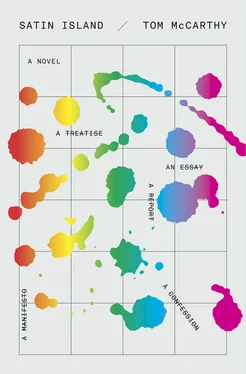6.11Back in my basement, in between various new tasks demanded of me by the Koob-Sassen Project — and against the constant, second-level mental puzzling laid down for me since my first day at the Company by this separate, all-important charge, this Great Report — I started a file on parachutists. Dead ones: ones whose parachutes had failed to open. It’s surprising how many times the story, or a variant on it, pops up: like oil spills, it’s generic. Even when I’d first read, on the tube, the initial three-line article about the episode, I’d had a sense of déjà-vu, a sense of having read this article, or one very like it, at least once before. Oh, a dead parachutist: one of those . Everyone can recognize and understand that situation. Before I’d ever heard of Vanuatans, the first joke I learnt to tell as a child was about a classified ad for a used parachute, “no strings attached.” To the anthropologist, as I explained before, it’s generic episodes and phenomena that stand out as significant, not singular ones. To the anthropologist, there’s no such thing as a singular episode, a singular phenomenon — only a set of variations on generic ones; the more generic, therefore, the more pure, the closer to an unvariegated or unscrambled archetype. The parachutist story, in the stark, predictable simplicity of the circumstance that it presented, in the boldness of its second-handness, was refreshing: in its unashamed lack of originality, it was original.
6.12The strange thing was, the more I started looking for dead parachutists, the more they started cropping up — in real time, I mean. Sure, I unearthed instances of parachutes failing to open, and suspicions being aired as to the cause, running back fifty years. There’d been a case in America where both main chute and reserve had ripped on opening, despite the odds against this happening from fabric fatigue alone being about ten million to one; and another one in Australia where a harness had quite inexplicably caught fire in mid-air; and so forth. But, in the very period during which I was compiling these cases — a period of no more than two and a half months — no less than three more stories hit the news involving parachutists slamming into the ground chuteless. They weren’t in England: one took place in New Zealand; one in Poland; one in Canada. And, of course, the particulars varied — but they all involved suspected acts of sabotage; and none of the cases, over this same period, was resolved. The replication, or near-replication, of these situations started buzzers ringing all over my head — and made the case of my own parachutist, the unfortunate soul whose death had snagged my interest in the first place, all the more gripping: an originally un-original event becoming even more un-original, and hence even more fascinating.
6.13One day, I went to Paris, and conducted the same type of staged enquiries that I’d carried out in London: a group of financial-service workers this time. There was no mirror; but I had a translator beside me, repeating phrases I’d half-understood on their first iteration softly in my ear. I left in the morning and came back in the evening. Daniel was right: the streets are all tarmaced and smooth. I hadn’t noticed that before. I also noticed that the Eurostar trains have a small but niggling design fault: when they attain top speed, the vacuum created beneath their undercarriage sucks the surrounding air in and funnels this on upwards through the intermittently open toilet flaps, with the result that urine blows back in the urinator’s face. I mused that, should the Company ever find itself hired by its former EU client’s sworn adversaries — hired, that is, by some right-wing, Europhobic lobby group — to come up with a symbol to express their cause, I would propose this glitch, this blowback water-feature.
6.14Madison phoned me while I was still on the train. When are you back? she asked. Tonight, I said. I want you here right now, she told me. Come straight to mine when you get in. I did. Lying in bed later, after we’d had sex, instead of picturing oil as I fell asleep like I had last time, my mind drifted through black streets. They were the streets of Paris — not so much the real Paris I’d just visited as an imaginary Paris formed in my head through the repetition of the fifty or so feet of it that had made up the background of Daniel’s roller-blading film. These streets, as I said, were black, all stripped of cobblestones and covered in a smooth, continuous tarmac coat. This coat was unrolling as I glided forward: unrolling more and more, decking the boulevards and avenues and alleyways in soft, black oblivion. Occasionally, as I passed such-and-such a spot, I’d be made half-aware that some historical event, some revolutionary episode, had taken place just there — but even as the knowledge flashed up it was extinguished, buried beneath the tarmac. This happened over and over again: whatever acts of insurrection, of defiance, or their markers and memorials, sprung up in an attempt to catch and trip the passing gaze, these were all smoothed out, muffled, drowned. The tarmac ran on endlessly, running each street into the next as I advanced along them, heading nowhere in particular, just gliding, on and on; on either side, at the periphery of my vision, coffee-chain concessions ran together, like the tarmac, in a smooth, unbroken blur. There was nothing dramatic about this; it wasn’t a disaster. No one was complaining, or even surprised: it was just the way it was. That’s just the way it is , a voice inside my head, perhaps my own, said. I might even have said it out aloud. Madison kind of grunted in her half-sleep. Then we were both gone.
7.1The Koob-Sassen Project. I won’t, as I’ve already stated, talk of this — and yet, during this period, everyone did, all the time. They discussed it not as people discuss things they know about, subjects whose properties and parameters are given, but rather as they try to ascertain those of a foreign object, one that is at once both present — omnipresent — and elusive: groping after its dimensions; trying, through mutual enquiry, to discern its composition, charge and limit. When, in the course of my professional activities, I asked people to provide a visual image that, for them, most represented it, I got answers varying from hovering spaceship to rabbit warren to pond lilies. I had my own, of course: I saw towers rising in the desert — splendid, ornate constructions, part modern skyscraper, part sultan’s palace lifted from Arabian Nights: steel and glass columns segueing into vaulted cupolas and stilted arches, tiled muqarnas , dwindling minarets that seemed, at their cloud-laced peaks, to shed their own materiality, turn into vapour. Below them, hordes of people — thousands, tens of thousands — laboured, moving around like ants, their circuits forming patterns on the sand; patterns that, in their amalgam, coalesced into one larger, more coherent pattern, just as the meandering, bowing, divagating stretches of a river delta do when seen from high enough above. What were they doing, all these ant-like labourers? Why, they were bringing in materials, or carrying out excavated soil, or delivering instructions they themselves, perhaps, did not quite understand, nor even, fully, did the person to whom they were relaying them, so complex was the logic governing the Project as a whole — instructions, though, whose serial execution, even if full comprehension was beyond the scope of any single point in the command-chain, had the effect of moving the whole intricate scheme towards its glorious realization, at which point all would become clear, to everyone, and ants would see as gods.
Читать дальше












